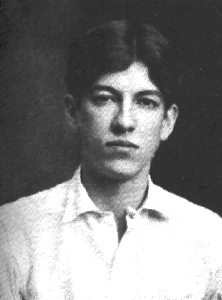 Alan Seeger as a student at Harvard in 1910
Alan Seeger as a student at Harvard in 1910
After graduating from Harvard in 1910, Seeger lived for two years in Greenwich Village where he wrote poetry and enjoyed the life of a young bohemian. The poetry he wrote then and while he was at the front was not published until 1917, a year after his death. Poems was not a successful work, due perhaps, according to Eric Homberger, to its lofty idealism and language, qualities out of fashion in the early decades of the twentieth century. Poems was reviewed in 1917 in The Egoist, where the critic commented that "Seeger was serious about his work and spent pains over it. The work is well done, and so much out of date as to be almost a positive quality. It is high-flown, heavily decorated and solemn, but its solemnity is thorough going, not a mere literary formality. Alan Seeger, as one who knew him can attest, lived his whole life on this plane, with impeccable poetic dignity; everything about him was in keeping." The man who wrote this review of Poems was T. S. Eliot, Seeger's classmate at Harvard.
Alan Seeger
Rendezvous
I have a rendezvous with Death
At some disputed barricade,
I have a rendezvous with Death
At some disputed barricade,
When Spring comes back with rustling shade
And apple-blossoms fill the air--
I have a rendezvous with Death
When Spring brings back blue days and fair.
It may be he shall take my hand
And lead me into his dark land
And close my eyes and quench my breath--
It may be I shall pass him still.
I have a rendezvous with Death
On some scarred slope of battered hill,
When Spring comes round again this year
And the first meadow-flowers appear.
God knows 'twere better to be deep
Pillowed in silk and scented down,
Where love throbs out in blissful sleep,
Pulse nigh to pulse, and breath to breath,
Where hushed awakenings are dear . . .
But I've a rendezvous with Death
At midnight in some flaming town,
When Spring trips north again this year,
And I to my pledged word am true,
I shall not fail that rendezvous.